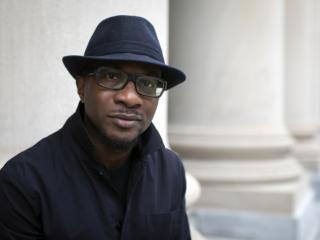On Native American reservations, high school basketball is huge. They have developed a fast-paced style of play called “rez ball.” New York Times reporter Michael Powell spent a season covering the team from Chinle High School in the Navajo Nation.More
Interviews By Topic
Science journalist Mark McClusky tells Anne that the secret to ever-increasing athletic performance is cutting-edge science and technology.More
The 1968 Olympic games changed everything for John Carlos. He and fellow runner Tommie Smith raised their fists in the Black Power salute on the podium in a moment that became known as the most defiant and controversial in Olympics history.More
New York Times Phys Ed columnist Gretchen Reynolds explains why movement is so important to our daily health, why running might be overrated, and how a little bit of pain can really maximize the benefit you see from your daily workout routine.More
Teju Cole grew up in Nigeria and then moved to U.S., joining millions of others in the African diaspora. He became an acclaimed novelist and photographer, and now celebrates the cosmopolitan culture of global cities, including Lagos and New York.More
When you’re visiting a new city, it helps to have a guide. Dejene Hodes took Anne and Steve on a tour of Addis Ababa, from the Mercato to the financial district. He says the city is bursting with entrepreneurial energy and ambition.More
Ghanaian post-colonial theorist Ato Quayson thinks a lot about globalization, diaspora and transnationalism. Because he’s a literary scholar, he decided to "read" a single street — Oxford Street in Accra — as a study of contemporary urban Africa.More
Historian Emily Calacci says the massive migration into African cities isn't following the Western model of urban development. Instead of an infrastructure of roads, railways and electric grids, many African cities rely on "people as infrastructure."More
Why does it seem like we always head into Monday feeling let down? Journalist Katrina Onstad explains how we ruined the weekend, and how to get it back.
More
In one recent study, 50 percent of people surveyed said they often or always feel exhausted from work. Emma Seppala says that it’s because collectively, we’re falling for outdated ideas about success.More
Writer B.J. Novak imagines a roller coaster that's modeled after real life, and designed by the artist Christo.More
At one point there were more than 1,500 amusement parks across America. Historian Lauren Rabinovitz says they helped ease the country into a period of rapid technological change.More
Kelly Link writes what she calls "slipstream fiction" — magical realist with a strong dose of weird.More
Cultural anthropologist Scott A. Lukas describes the history and cultural significance of theme parks such as Disney World.More
New York Times Book Review Editor Pamela Paul on why reading — and more importantly, a deep connection to when, why, where and how of what we read — is so important at every age. More
Author Susan Orlean on how the worst library fire in American history brought an entire city together to save 700,000 books.More
Eye-to-eye epiphanies are experiences of kinship with the more-than-human world. Gavin Van Horn says kinship is also something to practice. He shares a few thoughts about how.More
Are we losing the ability to read difficult books? Cognitive scientist Maryanne Wolf says we need to develop a "bi-literate reading brain" so that we can switch back and forth between the deep reading of print and the skimming of electronic texts.More


















